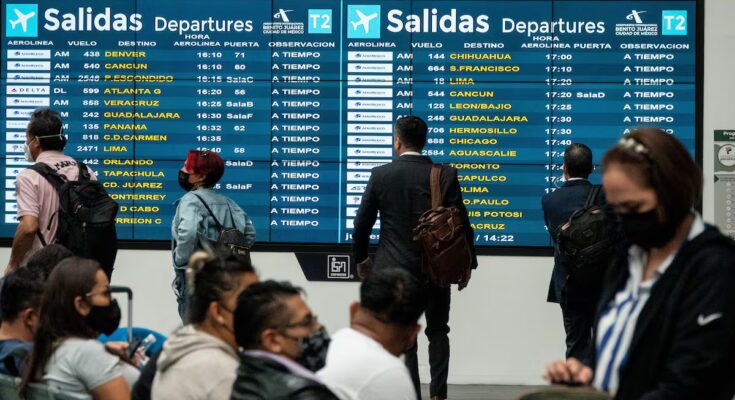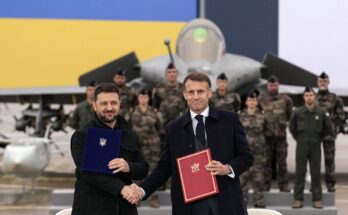Washington scored a point against Mexico in the battle for the skies. Mexican President Claudia Sheinbaum said Monday that flights at Mexico City International Airport (AICM) will be reallocated to give more flights to US airlines, which had been eliminated in 2022. The Sheinbaum administration’s decision comes after Donald Trump’s government canceled 13 Mexican airline routes to the United States in retaliation for Mexico’s airline policy. “There was a distribution of the slots (landing and take-off times) where Mexican airlines waive theirs slots to US airlines, within a framework of competitiveness,” he said. Sheinbaum also announced that next year a digital system will go live at AICM so that there will be sufficient competition and distribution for all airlines.
Sheinbaum reached an agreement with Mexican airlines to give up their schedules to American competitors. The agreement agreed behind closed doors between the president and Mexico’s main airlines, Aeroméxico, Volaris and VivaAerobus, aims to resolve the crisis opened by the United States since mid-year regarding alleged violations by Mexico of the binational aviation agreement, signed in 2015. Washington accused the southern neighbor that the airline policy promoted in 2022, during the government of Andrés Manuel López Obrador, has seriously damaged the companies US airlines. That year, López Obrador scaled back operations at AICM and prohibited cargo flights at that terminal, citing aviation security reasons and the need to decongest AICM, an airport that receives more than 40 million passengers a year. However, for industry specialists, López Obrador’s ordinance also aimed to redirect some of the flights to the then newly inaugurated Felipe Ángeles Airport (AIFA), his emblematic project in aviation.
Three years later, Trump complained to Mexico about the reduction slots in the AICM and, in retaliation, canceled 13 Mexican airline routes in service or about to take off to the United States late last month. Flights to cities such as Miami, Los Angeles, New York, Houston, among other cities, were canceled for a day. Additionally, Washington has frozen any expansion of Mexican airline services between the United States and the AICM. The issue is not trivial, the US market absorbs approximately 70% of international tourists traveling to or from Mexico. On the eve of the December Christmas holidays and the imminent celebration of the World Cup in Mexico, the measure triggered the alarm of the country’s airlines and the airports in the center of the country, in particular AIFA, which three years after its inauguration is operating at a third of its capacity, serving 6.3 million passengers a year.
The U.S. Department of Transportation has established its position from the beginning: It would reconsider its veto on Mexican flights if Mexico, in turn, reversed its aviation policy and returned the slots to their airlines. Washington’s position has placed the federal government in front of the dilemma of whether to maintain the air strategy promoted by López Obrador, despite the economic costs for airlines and airports, or give in to pressure from the United States. The Mexican government sought a third way to address the conflict through the redistribution of the 44 slots hourly average managed by the AICM, a resolution in which Mexican airlines will have to give up space.
However, with this measure, the Mexican government is trying to convince the US administration to once again allow the opening of new routes from AIFA and AICM to the United States. Sheinbaum assured the National Palace on Monday that it was underlined in the meetings in Washington that the intention is to promote the two airports, both at the AICM and the AIFA, and that this also requires the support of US airlines. “Talks will continue for several weeks with the understanding that we can reach an agreement,” the president added.
Rogelio Rodríguez, aviation law expert at UNAM, points out that the president of Mexico has made a surgical maneuver with other airlines to respect the aviation agreement signed between the two countries in 2015 and return the requested flights to the United States without expanding the operations of the congested AICM. A tactic that seeks to open the door for the Treasury Department to remove the veto it has on AIFA and to restart its flights to Austin, New York, Chicago, Dallas, Los Angeles, among others. “In this conflict, what weighed enormously was the AIFA veto, with flights to the United States any terminal has economic vitality, the North American market is the salvation for Mexican aviation,” he says.
In less than a month, the Mexican government has put intense pressure on the country’s national airlines to return space to the United States. The UNAM expert anticipates that the granting of the slots in favor of airlines will put the conflict with the United States in the freezer, but the issue will remain dormant. After Sheinbaum’s announcement, the return remains to be awaited slots In Washington it is enough and opts to remove the veto from AIFA, the flagship airport of the Morenoist administrations.



